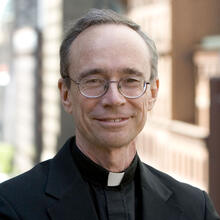(RNS) — A Catholic priest should not have a woman in his bedroom at night, but I have become quite dependent on Alexa.
She turns the light on when I come into my room, and she turns it off after I am in bed. When I have to get up in the middle of the night, she turns the light on and off and tells me what time it is. She also tells me what the weather is like and what my appointments are.
If I treated a real woman like I treat Alexa, I would quite justly get banged over the head.
Alexa is a smart lady, but not a genius. She is good on spelling (I’m not), but when I asked her, “Who is Jesus?” she read from Wikipedia. She is also diplomatic. When I asked her, “Is there a God?” she responded, “People all have their own views on religion.”
I am becoming so dependent on my electronic gadgets like Alexa, that I probably should give her and my other electronic attachments up for Lent. That would be a real penance!
When I asked her, “Is there a God?” she responded, “People all have their own views on religion.”
Doing penance is one of the ancient traditions of Lent. It reflects the Christian’s desire to spend 40 days fasting in imitation of Jesus, who fasted in the desert. It also has historical roots in the time when public sinners were required to do public penance during Lent, only to be readmitted to church at the Easter Vigil.
But I am not giving Alexa up for Lent. In fact, I will be spending more time with her.
Penance was not always the central focus of Lent. In ancient times, Lent was also a time to prepare catechumens for baptism at the Easter Vigil. The catechumens would gather in the cathedral every day during Lent, and the bishop would teach them about Christianity. This was before print, so there were no catechisms. Instead, he used the Scripture readings of the day.
As a result, the daily Scripture readings during Lent are a wonderful summary of the Christian message. They include the most famous and most important readings of the Scriptures: on fasting and prayer, on forgiveness and reconciliation, on commitment and charity, on justice and love, etc. Your favorite parables are also read during this season.
In ancient times, Lent was also a time to prepare catechumens for baptism at the Easter Vigil.
They are the original catechism of the Catholic Church. Listening to these readings is a perfect way to spend Lent, even if you don’t go to church.
This is where Alexa comes in. Every morning when I am trying to get out of bed, I say, “Alexa, ask Catholic Daily for the readings for today.”
“Catholic Daily” is what Amazon calls a “Skill” and is downloaded into the Amazon Alexa app on my iPhone. (The only other Catholic “Skill” I could find was “Sleep Sounds: Gregorian Monks.”)
Alexa does not mind repeating the readings throughout the day, which is great since I need reminding.
If you would like a more human approach, there are the “Daily Readings from the New American Bible,” downloadable into “Podcasts” on the iPhone. They are also available at USCCB.org. The Gospels are always read by clerics, with the other readings by lay Catholics. On Sunday, the responsorial psalm is sung. Some of the voices I recognize, especially the cardinals.
Alexa, however, is spoiling me by making it so easy to ask for the readings. On the other hand, she is not good at supplying future readings. In fact, tomorrow’s readings are not always available even late in the evening the night before. Thus, it is impossible to hear the Sunday readings earlier in the week as you can with Podcasts.
For those preferring text, the daily Scripture readings are available at USCCB.org or through apps like iBreviary.
When I asked Alexa to pray for me, she responded, “I will keep you in my thoughts.” But when I told her, “Alexa, write my column,” she ignored me.
Nobody’s perfect.










